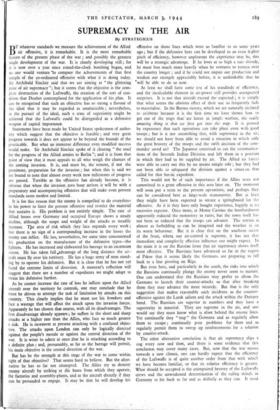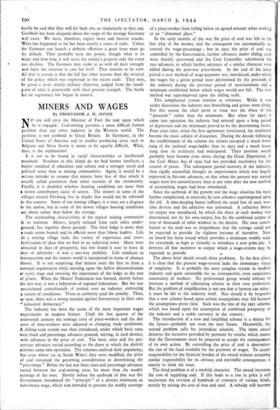SUPREMACY IN THE AIR
By STRATEGICUS
BY whatever standards we measure the achievement of the Allied air offensive, it is remarkable. It is the most remarkable feature of the present phase of the war ; and possibly the greatest
single development of the war. It is clearly developing still ; for it is now over a year since round-the-clock bombing began, and no one would venture to compare the achievements of that first sample of the co-ordinated offensive with what it is doing today. Sir Archibald Sinclair said that we are aiming at " the glittering prize of air supremacy "; but it seems that the objective is the com-
plete destruction of the Luftwaffe, the creation of the sort of con- dition that Douhet contemplated for the application of his plan. It
can be recognised that such an objective has so strong a flavour of the ideal that it may be regarded as unattainable ; nevertheless, in the pursuit of the ideal, such a state of superiority might be achieved that the Luftwaffe could be disregarded as a defensive weapon of capital importance.
Statements have been made by United States spokesmen of autho- rity which suggest that the objective is feasible ; and very great progress towards it does not appear to be beyond the bounds of the practicable. But what an immense difference even modified success would make. Sir Archibald Sinclair spoke of it clearing " the road for the progress of the Allied armies to Berlin"; and it is from that
point of view that it most appeals to all who weigh the chances of the coming invasion. It is, and must be, the. remote, if not the
proximate, preparation for the invasion ; but when this is said we are bound to note that almost every week new milestones of progress are passed. Terrible as the offensive has already become, it is obvious that when the invasion zero hour arrives it will be with a preparatory and accompanying offensive that will make even present standards seem modest and limited.
It is for this reason that the enemy is compelled to do everythine in his power to limit the present offensive and restrict the material that sustains it. His problem is not entirely simple. The rate of Allied losses over Germany and occupied Europe shows a steady decline, although the scope and weight of the attacks as steadily increase. Tie area of risk which they face expands every week ; but there is no sign of a corresponding increase in the losses the enemy can inflict. He has, nevertheless, for some time concentrated his production on the manufacture of the defensive types—the fighters. He has increased and elaborated his barrage to an enormous extent. He has taken full advantage of the long distance the air- craft must fly over his territory. He has a huge army of men stand- ing by to operate his defensive. But it is clear that he has not yet faced the extreme limits of diversion. A moment's reflection will suggest that there are a number of expedients we might adopt to strain his defensive further.
As he cannot increase the rate of loss he inflicts upon the Allied aircraft over the territory he controls, one may conclude that he
must be driven to attempt the task of limitation by attacks on this country. This dearly implies that he must use his bombers and face a wastage that will affect the attack upon the invasion forces.
Apparently he has chosen that course, with all its disadvantages. The first disadvantage already appears; he suffers in the short and sharp attacks at a higher rate than the Allies, who face so much greater a risk. He is moreover at present attacking with a confused objec- tive. The attacks upon London can only be logically directed against the people's morale or against the central direction of the war. It is wiser to admit at once that he is attacking according to a definite plan ; and, presumably, as far as the barrage will permit, his main objective is the central direction of the war.
But has he the strength at this stage of the war to come within sight of that objective? That seems hard to believe. But the alter- native he has so far not attempted. The Allies try to destroy enemy aircraft by striking at the bases from which they operate, the factories and assembly-plants, and at the aircraft directly if they can be persuaded to engage. It may be that he will develop his
offensive on those lines which were so familiar to us some years ago ; but if the defensive here can be developed to an even higher pitch of efficiency, however unpleasant the experience may be, this will be a strategic advantage. If he loses at so high a rate already, he must lose much more heavily when he ventures to remain over the country longer ; and it he could not impair our production and weaken our strength appreciably before, it is unthinkable that he will be able to do so now.
At least we shall have some test of his standards of efficiency, and the incalculable element in air-power still provides unexpected surprises. It is not that aircraft exceed the expected ; it is simply that what seems the obvious effect of their use so frequently fails to materialise. In the Burma victory, which we are naturally inclined to celebrate because it is the first time we have shown how to
get out of the traps that-are latent in jungle warfare, the reatlY amazing thing is that we first got into the trap. It is proved by experience that such operations can take place even with good
troops ; but is it not astonishing that, with supremacy in the air; we should not have been able to avoid a situation in which only the great bravery of the troops and the swift decision of the com- mander saved us? The Japanese contrived to cut the communica- tions of the Seventh Indian Division and left them in a position in which they had to be supplied by air. The Allied air forces were able to carry out this by no means simple role ; but they had not been able to safeguard the division against a situation that called for that heroic expedient.
This would not be of such importance if the Allies were not committed to a great offensive in this area later on. The monsoon will soon put a term to the present operations, and perhaps they can be considered best as large-scale manoeuvres. But at least they might have been expected to secure a springboard for the offensive. As it is they have only bought experience, happily at no excessive expense. Once more, at Monte C.as‘sino the bombardment apparently reduced the monastery to ruins, but the town itself has not been so reduced that the troops can advance. The terrain is almost as forbidding as can be imagined and the weather is on its worst behaviour. But it is clear that on the southern sector of the front, where our air-control is supreme, it has not that immediate and completely effective influence one might expect. In the main it is on the Russian front that air supremacy shows itself most effective. The Russians have advanced so far in the region of Pskov that it seems likely the Germans are preparing to fall back to a line pivoting on Riga.
But even here, and particularly in the south, the risks into which the Russians continually plunge the enemy never seem to mature.
One can understand that the Russians may prefer to allow. the Germans to launch their counter-attacks so that after breaking them they may advance the more securely. But that is the only suggestion that makes reasonable such incidents as the counter- offensive against the Lutsk salient and the attack within the Dnieper bend. The Russians are superior in numbers and they have a superiority in material. They are supreme in the air, and one would say they must know what is afoot behind the enemy lines. Yet continually they " trap " the Germans and as regularly allow them to escape ; continually pose problems for them and as regularly permit them to sweep. up reinforcements for a solution by counier-attack.
The other alternative conclusion is that air supremacy slips a cog every now and then, and there is some evidence that this conclusion may cover many cases. But, now that the war moves towards a new climax, one can hardly expect that the efficiency of the Luftwaffe is of quite another order from that with which
we have become familiar, or that its relative efficiency is greater. What should be accepted is the unimpaired bravery of the Luftwaffe
crews and the unweakened determination of the ruling minds, in Germany to hit back as far and as skilfully as they can. It need hardly be said that they will hit back also as vindictively as they can. Goebbels has been eloquent about the scope of the revenge Germany will exact. We must, therefore, expect more and heavier attacks. What has happened so far has been merely a series of raids. Unless the Germans can launch a definite offensive a great issue must go by default. They probably have the power, though what is its scope and how long it will serve the enemy's purpose only the event can disclose. The Germans may strike at us with all their strength and leave the invasion to care for itself. That remains to be seen. All that is certain is that the lull has other reasons than the reversal of the policy which was expressed in the recent raids. They may, be given a more strictly military objective, judged from the stand- point of what is practicable with their present strength. The battle for air supremacy has begun in earnest.



























 Previous page
Previous page